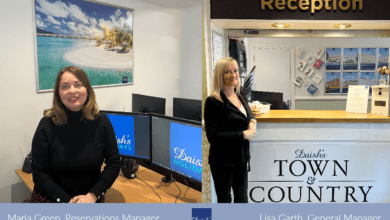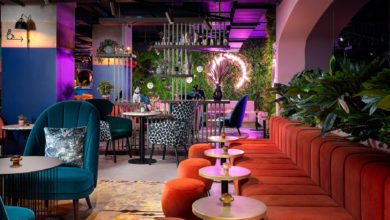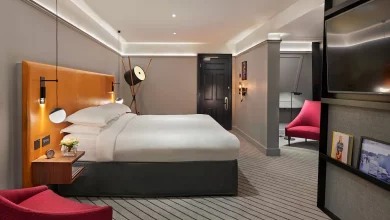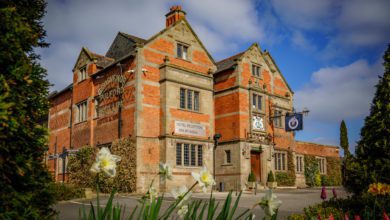The Cottage in the Wood Malvern’s journey to sustainability
Nick Davies, the current owner of The Cottage in the Wood Malvern, invested in a £2.4m refurbishment to make the hotel reach its environmentally-friendly potential. Here he tells us about the process and transformation of the property

Can you tell us a bit about your career in hospitality? How did you come to acquire The Cottage in the Wood Malvern?
My former career as a civil servant and strategy consultant allowed me to advise on energy, corporate restructure, government and venture capital. I then left Shoreditch in London in 2015 to take on the ownership and management of the 32-bedroom hotel, The Cottage in the Wood Malvern in Worcestershire.
Together with my wife Julia, we have managed a three-phase refurbishment of the hotel worth £2.4m to create an award-winning boutique destination hotel, bar and restaurant. In addition, I also advise other investors on boutique hotel acquisitions across the UK, and I have a few exciting ventures in the pipeline!
Has sustainability been a lifelong interest for you and do you think owning this hotel has made you more sustainability conscious?
Sustainability has always been an interest of mine. I used to advise the government on sustainability, in particular developing a multi-billion-pound green fund through the utilisation of built assets. When we took ownership of The Cottage in the Wood Malvern, we were presented with a very diverse project, with a Georgian Manor house, a separate cottage and an old Coach House making up the fabric of the hotel. We had to look at each separate part of the build to ensure we could use the most eco-friendly materials for the age, structure and restrictions of each asset.
Sustainability means so many different things to different people, and this leads to such a wide gap in how businesses apply it. I prefer to think of sustainability as one of the strategic pillars of the business. It needs to be part of the whole journey – it cannot be an afterthought. Have a 360 view and make it measurable. Sustainability cannot be a strap line that you plaster on what you do. It is something that must be embedded in the business in everything, from the early design stages of any physical improvement works to major capex spending.
What are some of the heavy-duty sustainable changes that you have made to the property?
At our hotel, the Coach House leads the hotel’s sustainability credentials with several savvy environmentally-friendly initiatives. The 19 bedrooms are constructed out of carbon neutral wood, and the insulation is created from recycled newspaper. The specialist design of the building enables much more efficient insulation, which means the building can cope with a heating system that is 50% smaller. This has a huge impact on reducing the hotel’s carbon footprint and improves the air quality to ensure a great night’s sleep.
Our new heated, covered terrace is also a great addition to the guest offering and innovative energy efficient black infrared heating ensures the space is kept warm for guests throughout the year.
It was incredibly important to me when making plans for our hotel that we improved the offering for our guests, whilst ensuring it also reduced our energy consumption and how much we paid.
ROI (return on investment) is important – you can still make sustainable choices and save money by taking a longer-term view, replacing energy products with more energy efficient choices, local suppliers to reduce transport costs and so on. In the current times, these are all obvious choices.
In your opinion, how can smaller hoteliers make their properties into more sustainable structures?
An eco-friendly hotel uses sustainable best practises in its supply chains, maintenance, and services to lessen its impact on the environment. Measures may include reducing energy and water consumption, aiming for zero waste generation, and using environmentally friendly products. To improve efficiency, hotels may also streamline processes employing systems or hotel automation software.
I advocate for hoteliers to look at the entire business and treat it a bit like a journey, which means everyone needs to get involved with the operation. It is an educational experience and recruitment is a key part of making this part of the purpose of the business. ESG (environmental, social and governance) is of interest to most people, so build it into the job spec to champion projects and make sure they look for innovations within their own departments. ESG also needs to be reflected in all communication, in social media presence and in your development plans. If everyone takes ownership, it will become ingrained in the business as a whole.
Does The Cottage in the Wood Malvern have anything planned in the run-up to Christmas?
Christmas is a wonderful time to visit The Malverns, and we are hoping for snow this year! Over the Christmas period, we have a fantastic three-night package that includes a five-course Christmas feast on the big day, carol singers, and a treat-filled hamper to take away.
Our sous chef, Henry, is already getting into the Christmas spirit, and is sharing videos on social media showing how to make the Cottage Christmas Pudding, using lots of local ingredients. We have a festive lunch menu available throughout the month of December, as well as a festive afternoon tea, and we are always open to those wanting to discuss having their Christmas party with us.
We’ve got a fantastic New Years Eve party planned, too, with live music and lots of entertainment, as well as a seven-course feast by our award-winning head chef, Rob Mason. It really is an exciting time!









